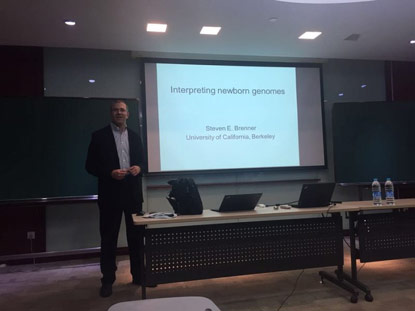Time:11:00 am, 19 April, 2016
Venue:2201 East Guanghua Tower
Host:Prof. David Waxman
Speaker:Steven E. Brenner
Title:Interpreting Newborn Genomes
Everyone is invited to attend
This presentation will introduce our current approaches and research in interpreting genomes, especially of newborns for rare disease. We developed an analysis protocol for individual genome interpretation and used its distinctive features to diagnose numerous clinical cases. We applied the protocol to exomes from newborn patients with undiagnosed primary immune disorders. To yield high quality sets of possible causative variants, we used multiple callers with multisample calling and integrated variant annotation, variant filtering, and gene prioritization.
Our protocol has been similarly revealing in other SCID and CID cases including early diagnosis of Ataxia Telangiectasia, Nijmegen Breakage Syndrome, as well as several novel syndromes. These cases highlight unique features of the analysis framework that facilitate genetic discovery. These help provide crucial information to offer prompt appropriate treatment, family genetic counseling, and avoidance of diagnostic odyssey.
This talk will also introduce a new project, called NBSeq, explores the feasibility of exome sequencing to augment or replace current tandem mass spectrometry (MS-MS) technologies for newborn screening. This aim is conducted under an IRB-approved protocol in collaboration with the California Department of Public Health, which has shared samples of de-identified archived DBS. Exome sequencing will be performed in all California newborns found to have metabolic disorders in the past decade, as well as samples that were false positives on the MS-MS screening.
The Critical Assessment of Genome Interpretation , is a community experiment to objectively assess computational methods for predicting the phenotypic impacts of genomic variation. In the experiment, participants are provided genetic variants and make predictions of resulting phenotype, for ten challenges. These predictions are evaluated against experimental characterizations by independent assessors. The fourth CAGI experiment is has just concluded, and initial results will be shared.


